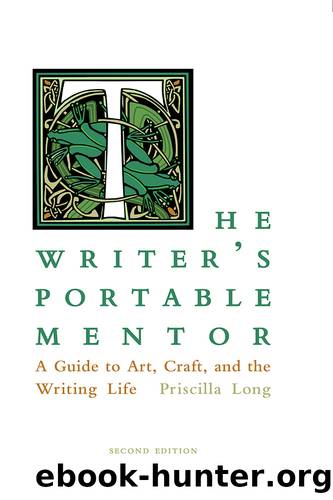The Writer's Portable Mentor by Priscilla Long

Author:Priscilla Long
Language: eng
Format: epub
Publisher: University of New Mexico Press
Published: 2010-10-15T00:00:00+00:00
Now letâs take a look at this structure.
First, the status quo is established. Who is this, when is this, where is this? Wolf Pinkas assumed his position of caretaker of the graveyard (caring for the dead) in the decade after World War II. The context of World War II in Eastern Europe (and, by implication, the genocidal atrocities that occurred) is immediately established.
First challenge to status quo or first statement of the complication. Owner can no longer pay for caretaking services.
Reaction: Wolf moves into a crypt and takes a pay reduction. Life and death are juxtaposed. Life: the ownerâs idea that Wolf might âwant company.â Death: Wolfâs knowledge of âoceans of tormented flesh.â Wolf is aligned with death. He even moves into a crypt. He moves in with death. He stays with the deaths of the past, which, we discover, include his entire family.
New status quo. Wolf fixes up the crypt. He picks up trash with a âwooden spearââan antique weapon wholly inadequate to the battles he must fight. Here his backstory of trauma and the war is told in the line âdim chaos of the boxcars and roads.â He gets his check, walks to bank and barber and grocer.
Second escalation of complication. The bank closes, so Wolf begins to take the trolley but then the trolley shuts down. Further, the frail elderly who come to tend the graves begin to die off. Plus, their children donât use this old traditional graveyard to bury their dead.
Reaction: Wolf has an increased workload but rather enjoys it. He has given his life to the care of the dead. The apparitions appear. Now he is dancing with the dead. He withdraws, goes out less and less.
Third escalation of complication. A four-lane highway replaces the street; public housing replaces the old houses. Young blacks who shatter bottles and write graffiti arrive.
Reaction: Wolf buys more paint.
Fourth escalation of complication. The development commissioner comes in to measure the graveyard. Dempsey, one of his two cats dies. (Note that in this story the big themes are life and death and the two cats mirror life and death. Think about setting up mirrors within a story.)
Reaction: Now Wolf retreats even further. Seldom leaves. Bolts the graveyard gate shut. Ignores graffiti rather than repainting it. The horrors of his past in Eastern Europe begin to return in his dreams: the dream of the stink of diesel and dead horses, his father heaped on a wet road, his sisters crying for potatoes, machine guns, bodies in pits, and the âdream of sleepâ of the titleâin his dream he is sleeping on his motherâs deathbed.
Fifth escalation of complication. Developer gets in with a hacksaw, informs that the city is going to build an arena on site and Wolf is going to lose his job.
Intruders complicate the complication. Long scene in which Wolf interrupts teenagers having sex in the childrenâs graveyard. The graveyard he canât bear to maintain. Again, life (sex) and death (the dead children) juxtaposed. Then the girl arrives at his crypt-home.
Download
This site does not store any files on its server. We only index and link to content provided by other sites. Please contact the content providers to delete copyright contents if any and email us, we'll remove relevant links or contents immediately.
| Authorship | Bibliographies & Indexes |
| Book Industry |
Asking the Right Questions: A Guide to Critical Thinking by M. Neil Browne & Stuart M. Keeley(5764)
Autoboyography by Christina Lauren(5228)
Eat That Frog! by Brian Tracy(4526)
Dialogue by Robert McKee(4389)
Sticky Fingers by Joe Hagan(4189)
Journeys Out of the Body by Robert Monroe(3619)
Annapurna by Maurice Herzog(3464)
Full Circle by Michael Palin(3443)
Schaum's Quick Guide to Writing Great Short Stories by Margaret Lucke(3376)
Elements of Style 2017 by Richard De A'Morelli(3343)
The Art of Dramatic Writing: Its Basis in the Creative Interpretation of Human Motives by Egri Lajos(3063)
Atlas Obscura by Joshua Foer(2955)
Why I Write by George Orwell(2945)
The Fight by Norman Mailer(2930)
The Diviners by Libba Bray(2927)
In Patagonia by Bruce Chatwin(2922)
The Mental Game of Writing: How to Overcome Obstacles, Stay Creative and Productive, and Free Your Mind for Success by James Scott Bell(2904)
Venice by Jan Morris(2570)
The Elements of Style by William Strunk and E. B. White(2470)
